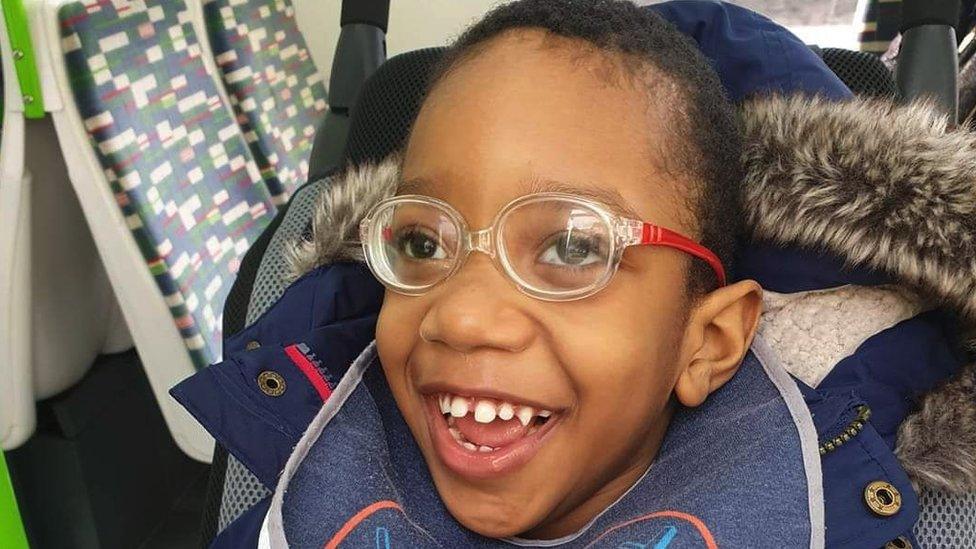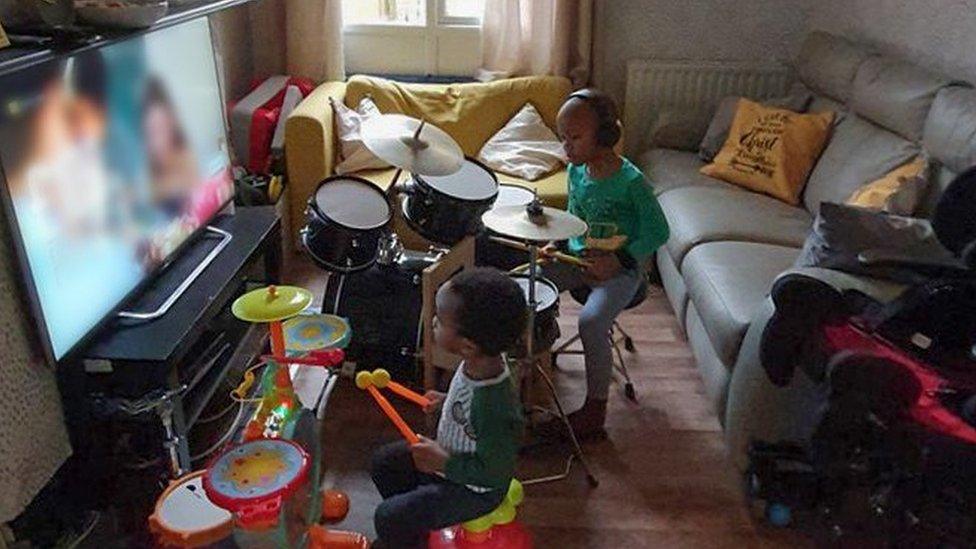The family of six in a one-bedroom flat due to inaccessible social housing
- Published

A family of six have been living in a one-bedroom flat because the social housing they were assigned was inaccessible to their disabled child.
Seven-year-old Joel Verala uses a wheelchair and is fed by a tube due to quadriplegic cerebral palsy.
The house has three bedrooms but the family have been told the adaptations he needs could take a year.
Croydon Council said it had always informed the family the work would take "some months to complete".
Joel's mum, Souskay Verala, describes her son as a "happy boy" on the BBC Access All podcast.
"He likes stories read to him, he loves his siblings playing around him, as well as walks outside," she says.
The family - Souskay, her husband and three children - were excited to be offered the three-bedroom council property in March having lived in a small flat for the previous six years.
But, though the new house was described as "suitable" for their needs, they maintain it needs adapting before Joel can live there. That includes a lift between floors, widened doors to enable his wheelchair to move through rooms, ramps into the property and hoists.
The planning application for the work is yet to be approved and the Veralas have been told it could take at least another 12 months for the work to be completed.
The council said the family could move in as Joel could stay on the ground floor.
It said: "We worked closely with this family, their doctors, and our children's social care and housing teams to find them the right home. We continue to work with them so they can make full use of their new home and are committed to progressing necessary works."

Listen to Access All on BBC Sounds
In the latest Access All podcast, Nikki Fox discusses Joel's access needs and the family's difficult housing situation with mum Souskay Verala.
Paralympic skier Millie Knight talks about her new sporting venture - making the England team in karate. She explains how she tackles both sports with 5% vision.
And Nikki goes to the blue badge queue where disabled people are queuing to see the Queen lying in state.


Souskay says the family felt they had no choice but to accept the new bigger house and move out of their original small home. "We didn't want to go there, but we have been waiting for so long [for a house]," she says.
But despite already paying rent and council tax on the property given to them, the family felt they could not move in while it remained inaccessible to their son and would prevent him from thriving.
Instead, the family of five moved in to the one-bedroom flat where Souskay's mother lives.
As well as having six people in the small property, space is further compromised by Joel's sizeable medical equipment, including wheelchair and specialist bed.
"It's very difficult for me to see my mum like that. She has a bad back and knees and she's sleeping on the sofa," Souskay says. "It's very stressful and I'm very anxious."

Christina McHale, from housing association Habinteg which specialises in accessible and adaptable properties for disabled people, says living in an accessible property is crucial to someone's quality of life and development.
"Frequently we hear about the transformational effect that it has on people's health and wellbeing at whatever age they are, and the independence and dignity which comes from having a home that meets their needs."
Souskay is also worried about the impact their housing situation is having on her two other, younger, children. She had moved them to a school closer to the new property but, as they don't yet live there, it presently means a journey of more than 30 minutes each way. And while her husband works full-time, Souskay is Joel's main carer.
Christina says when it comes to children's access requirements, not enough thought is always given to the fact children grow and their needs change rapidly.
Souskay is not alone in facing such predicaments. While Croydon Council is footing the bill for Joel's adaptations, lots of disabled people use a Disabled Facilities Grant (DFG) to fund necessary enabling changes. Grants of up to £30,000 can be awarded in England.
Legally, the work should be completed within 12 months, but for many the process takes far longer.
In 2020, national disability charity Leonard Cheshire found 67% of councils failed to complete the work within a year while 23% took longer than two years.
And in 2018, the Equality and Human Rights Commission found that the average waiting time for an accessible property was 25 months.
Habinteg has been working with Homefinder UK, a non-profit organisation focused on matching social housing with the right people to try and improve the current situation.
They have recently developed the Accessible Now register which Homefinder's UK CEO, Ninesh Muthiah, describes as a way "to improve access to either fully wheelchair accessible social housing or partially adapted housing".
It uses occupational therapists to assess the properties before they are advertised and matched with people who need the adaptations available, although it can mean relocating out of area which is not always welcome, especially if you have a well established support network.
But Ninesh says, nationally, there are currently big "barriers" to accessing adequate social housing.
"Supply is the biggest challenge," he says. "There's been a lot of issues post-Covid and post-Brexit because organisations can't do repairs 'as quickly as possible' and they can't get materials or labour."
But changes are on the horizon.
Earlier this year the government announced that all newly built properties must meet the "accessible and adaptable" criteria, sometimes known as the Lifetime Home Standard.
This includes building properties with wider doorframes for wheelchairs to get through, strong bathroom walls for rails to be fitted as residents age and in larger properties the ability to convert the downstairs toilet into a wet room.
But for Souskay the changes have come too late and the situation is having a huge impact on her entire family.
"I love my mum. But we need our space. I want to feel that I have a family and I have a place on my own, and I enjoy being there."
You can listen to the podcast and find information and support on the Access All page.
